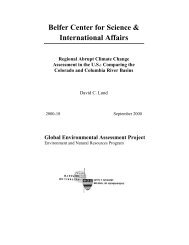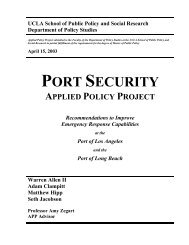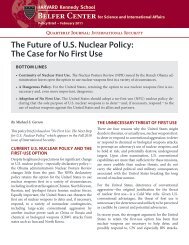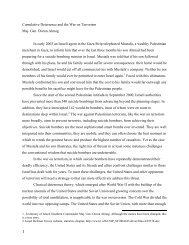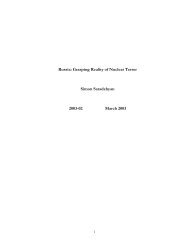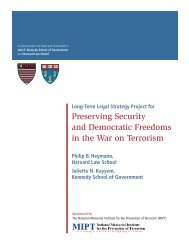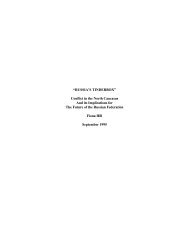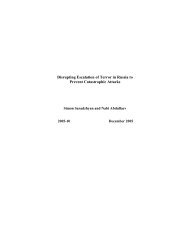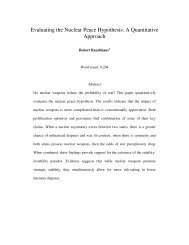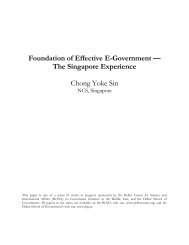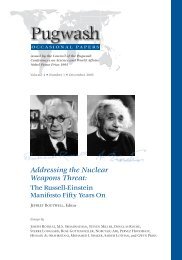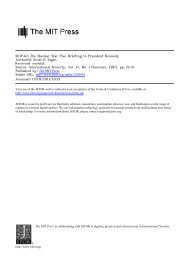The Heart of the Matter Valerie M. Hudson, - MIT Press Journals
The Heart of the Matter Valerie M. Hudson, - MIT Press Journals
The Heart of the Matter Valerie M. Hudson, - MIT Press Journals
You also want an ePaper? Increase the reach of your titles
YUMPU automatically turns print PDFs into web optimized ePapers that Google loves.
<strong>The</strong> <strong>Heart</strong> <strong>of</strong> <strong>the</strong> <strong>Matter</strong> 29<br />
<strong>The</strong> empirical literature linking <strong>the</strong> security <strong>of</strong> women to <strong>the</strong> security <strong>of</strong><br />
states does not, however, generally conform to accepted (though contested)<br />
social science norms <strong>of</strong> standard statistical hypo<strong>the</strong>sis testing. Important<br />
<strong>the</strong>orists in feminist security studies have argued that such methodological<br />
norms are ei<strong>the</strong>r an uncomfortable ªt with feminism or anti<strong>the</strong>tical to a feminist<br />
stance. 74 Using in-depth ethnographic case studies, process tracing, and<br />
poststructuralist discourse analysis, many ªne empirical works in feminist security<br />
studies have been penned. 75 Never<strong>the</strong>less, <strong>the</strong>ir insights remain at <strong>the</strong><br />
margins <strong>of</strong> mainstream security studies because <strong>the</strong> initial hurdle after <strong>the</strong>oretical<br />
assertion—to wit, acceptable conventional empirical warrant—has not<br />
been cleared.<br />
We agree with those who lament this marginalization. 76 At <strong>the</strong> same time,<br />
we believe that this hurdle can be cleared. Indeed, it is possible that <strong>the</strong><br />
marginalization <strong>of</strong> feminist insights derived from unconventional methodologies<br />
would lessen as a result. We do not believe that conventional empirical<br />
methodologies are anti<strong>the</strong>tical to feminist research; indeed, very valuable insights<br />
can be gained from feminist use <strong>of</strong> conventional methodology. 77 Here<br />
we survey several examples <strong>of</strong> how this may be done, noting that <strong>the</strong>re are<br />
similar small literatures linking women and state security that we do not examine<br />
here, in ªelds such as comparative politics, geography, and psychology.<br />
In a recent empirical analysis <strong>of</strong> Muslim societies, Steven Fish disconªrms<br />
<strong>the</strong> notion that Islamic societies per se are disproportionately involved in<br />
conºict or disproportionately suffer from authoritarian rule. 78 Ra<strong>the</strong>r, Fish un-<br />
and Gender Equality: Who and What Is It Good For?” paper presented at <strong>the</strong> International Studies<br />
Association, Chicago, Illinois, March 2007. See also Peace Women, http://www.peacewomen.org.<br />
74. J. Ann Tickner, “What Is Your Research Program? Some Feminist Answers to International Relations<br />
Methodological Questions,” International Studies Quarterly, Vol. 49, No. 1 (March 2005),<br />
pp. 1–21; V. Spike Peterson, “(On) <strong>The</strong> Cutting Edge: Feminist Research in International Relations,”<br />
presentation at <strong>the</strong> University <strong>of</strong> Arizona Association for Women Faculty Meeting, Tucson,<br />
Arizona, February 1991; Sylvester, “‘Progress’ as Feminist International Relations”; and Jill Steans,<br />
“Engaging from <strong>the</strong> Margins: Feminist Encounters with <strong>the</strong> ‘Mainstream’ <strong>of</strong> International Relations,”<br />
British Journal <strong>of</strong> Politics and International Relations, Vol. 5, No. 3 (August 2003), pp. 428–454.<br />
75. See, for example, Lene Hansen, Security as Practice: Discourse Analysis and <strong>the</strong> Bosnian War (New<br />
York: Routledge, 2006); Sandra Whitworth, Men, Militarism, and UN Peacekeeping: A Gendered Analysis<br />
(Boulder, Colo.: Lynne Rienner, 2004); Dubravka Zarkov, <strong>The</strong> Body <strong>of</strong> War: Media, Ethnicity, and<br />
Gender in <strong>the</strong> Break-Up <strong>of</strong> Yugoslavia (Durham, N.C.: Duke University <strong>Press</strong>, 2007); and Dyan<br />
Mazurana, Angela Raven-Roberts, and Jane Parpart, eds., Gender, Conºict, and Peacekeeping<br />
(Lanham, Md.: Rowman and Littleªeld, 2005).<br />
76. Sylvester, Feminist International Relations.<br />
77. Mary Caprioli, “Feminist IR <strong>The</strong>ory and Quantitative Methodology: A Critical Analysis,” International<br />
Studies Review, Vol. 6, No. 2 (June 2004), pp. 253–269.<br />
78. M. Steven Fish, “Islam and Authoritarianism,” World Politics, Vol. 55, No. 1 (October 2002),<br />
pp. 4– 37.



